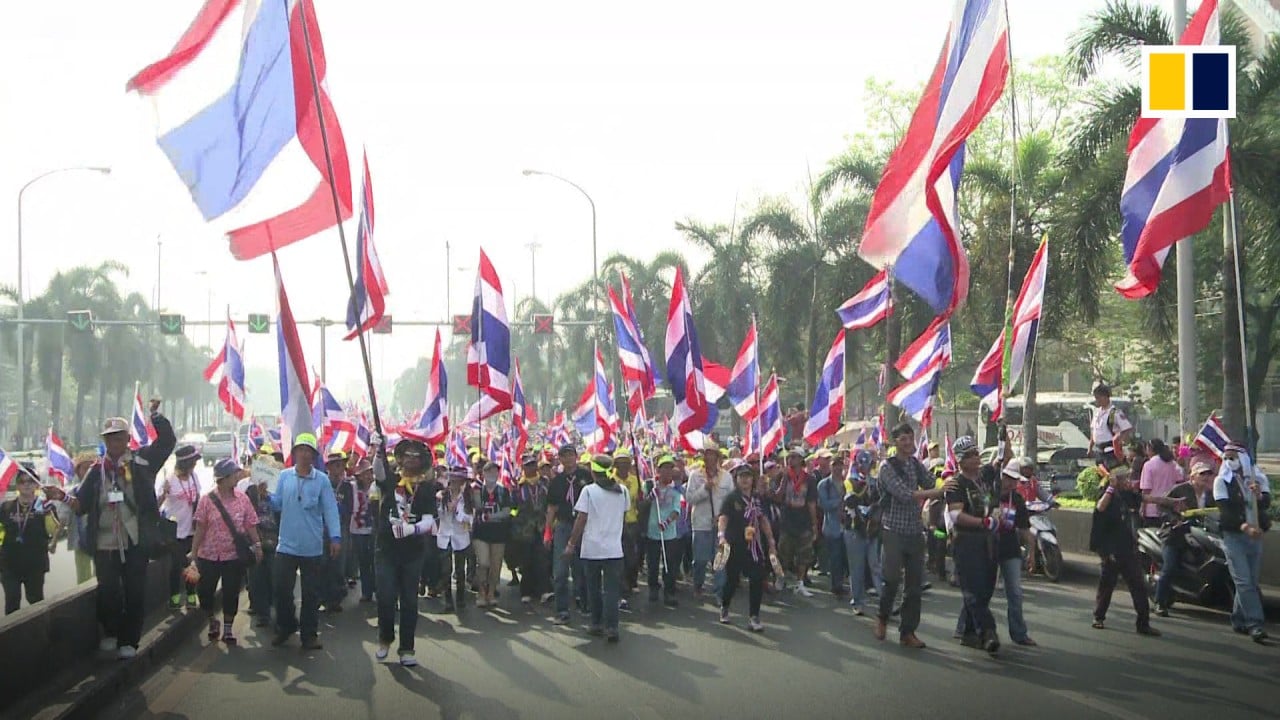
Explainer | Thailand’s politics and monarchy
- These are the players and the situation on the ground as the junta-led Southeast Asian nation gears up for its first election since 2011
Since the establishment of a constitutional monarchy in 1932, its on-off democracy has been punctuated by 19 attempted coups d’état – 12 of which were successful.
In recent years the country has been deeply divided between support and opposition for Thaksin Shinawatra, the former prime minister overthrown by the military in 2006. In 2011, Thaksin’s sister Yingluck became Thailand’s first female prime minister, but three years later she too lost power in a military coup.

Still, even with Thaksin and Yingluck both living in self-exile, the Shinawatra clan continues to hold considerable influence, particularly among poor rural voters in northeast Thailand.
Parties linked to Thaksin have won every election since 2001. However, the Shinawatras suffered a blow this month when the Constitutional Court disqualified the Thai Raksa Chart party – founded by allies of Thaksin – from contesting this year’s vote due to its abortive pick of King Maha Vajiralongkorn’s sister, Princess Ubolratana, as its candidate for prime minister.

04:05
Military, monarchy and coloured shirts: Thailand’s political power players
SHINAWATRAS, RISE AND FALL
Thaksin, a policeman turned telecommunications multibillionaire, won a sweeping election victory in 2001 and became the first prime minister in Thailand’s history to serve a full term. His platform of universal health care and debt alleviation appealed to the country’s poor rural majority, and Thaksin was re-elected in a landslide victory in 2005.
However, Thaksin’s time in office was marred by allegations of graft and abuse of power. He also declared a controversial war on drugs, which claimed the lives of more than 2,500 people in 2003.
In September 2006, Thaksin was deposed by a bloodless coup while he was at the United Nations General Assembly in the United States.
The ex-leader is now living in Dubai to avoid a two-year prison sentence over corruption charges he contends were politically motivated.

Thaksin’s supporters form the backbone of the “red shirts”, who clash with the royalist elite “yellow shirts” who were behind the protest movement that led to the 2006 coup.
Violence broke out in 2010 when the army cracked down on red-shirt demonstrators in downtown Bangkok. The protests in April and May resulted in the death of 91 people.
In the 2011 election, Yingluck led the Pheu Thai party in a triumph over the outgoing coalition government led by the Democrat party. Opponents argued that the businesswoman and novice politician was merely a mouthpiece for her exiled brother.
On May 22, 2014, Prayuth staged a coup against Yingluck’s government after widespread discontent at the introduction of a controversial political amnesty bill, which was seen as a way to allow Thaksin to return to Thailand without having to serve his prison sentence.
Yingluck fled the country in August 2017, just before she was found guilty of criminal negligence in a money-losing rice subsidy scheme and sentenced to a five-year jail term, a charge she says the junta has trumped up.
THE ROYAL SUCCESSION
Throughout his 70-year reign, the late King Bhumibol Adulyadej was seen as a symbol of stability and a unifying force in the politically polarised country.
Hundreds of thousands of Thais took to the streets to pay their respects when the revered king died in October 2016.
His son, King Vajiralongkorn, does not enjoy the same level of public support. However, Thailand’s strict lèse-majesté laws forbid any defamation, insult or threat to the monarchy. Violators can be punished with a maximum prison sentence of 15 years.
King Vajiralongkorn will be officially crowned in a three-day ceremony from May 4 to 6.

THE BASICS
Population: 69.04 million*
Capital: Bangkok
Area: 513,120 sq km
Official language: Thai
Currency: Baht
GDP: US$455.3 billion*
*figures for 2017, according to the World Bank
KEY DATES
1997: Thai authorities let the baht float, abandoning its peg to the US dollar. This triggered a wave of currency speculation across East and Southeast Asia. The Asian financial crisis seriously impacted Indonesia, Malaysia, the Philippines, South Korea and Thailand
2006: Prime minister Thaksin Shinawatra is toppled by an army coup
2010: Pro-Thaksin “red shirt” supporters paralyse the streets of Bangkok. The army storms the demonstrators’ barricades, causing 91 casualties
2011: A Thai-Cambodian sovereignty dispute over the area surrounding the Preah Vihear Temple results in a total of 18 deaths
2014: The military seizes power and ousts prime minister Yingluck Shinawatra from power
2016: King Bhumibol Adulyadej, the world’s longest-reigning monarch, dies at age 88. Crown Prince Vajiralongkorn is proclaimed king, replacing his late father
2019: The first general election the country has seen in eight years is scheduled for March 24; the coronation of King Vajiralongkorn is set for May 4 to 6

